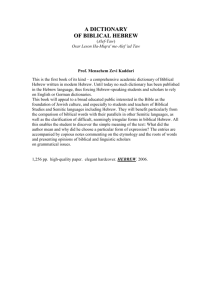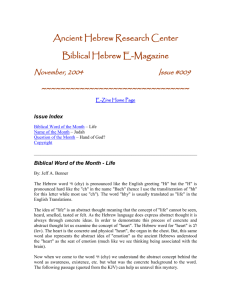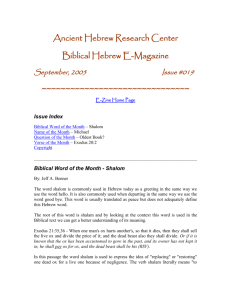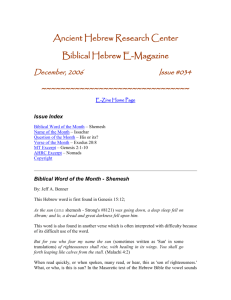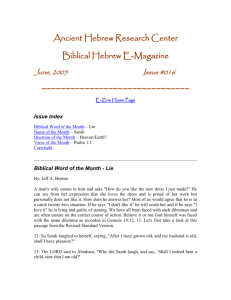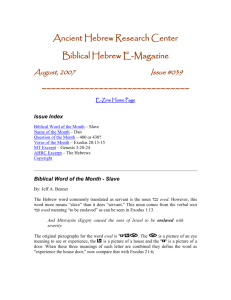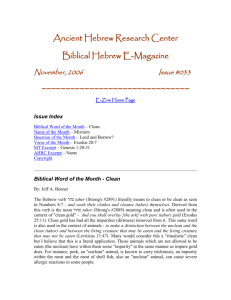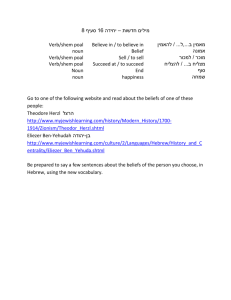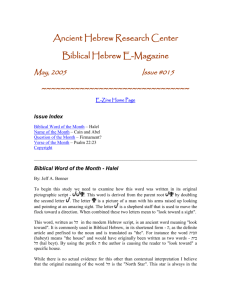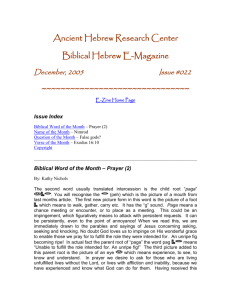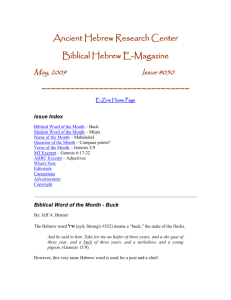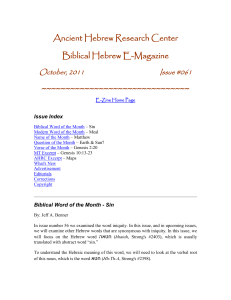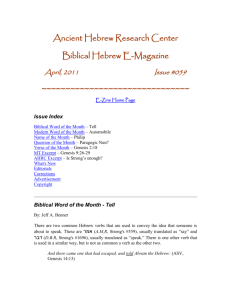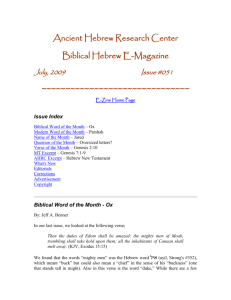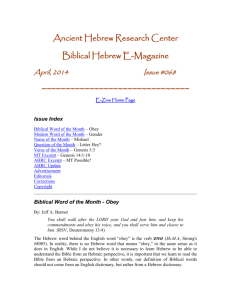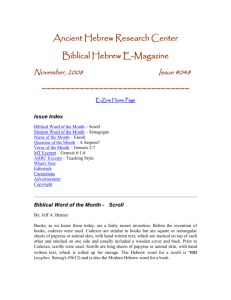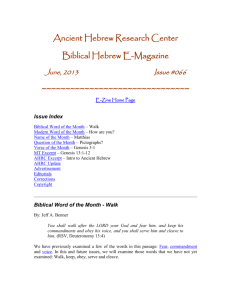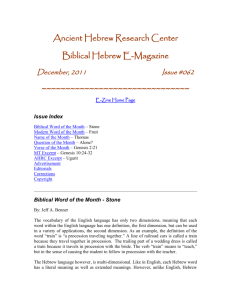Biblical Hebrew E-Magazine - Ancient Hebrew Research Center
advertisement
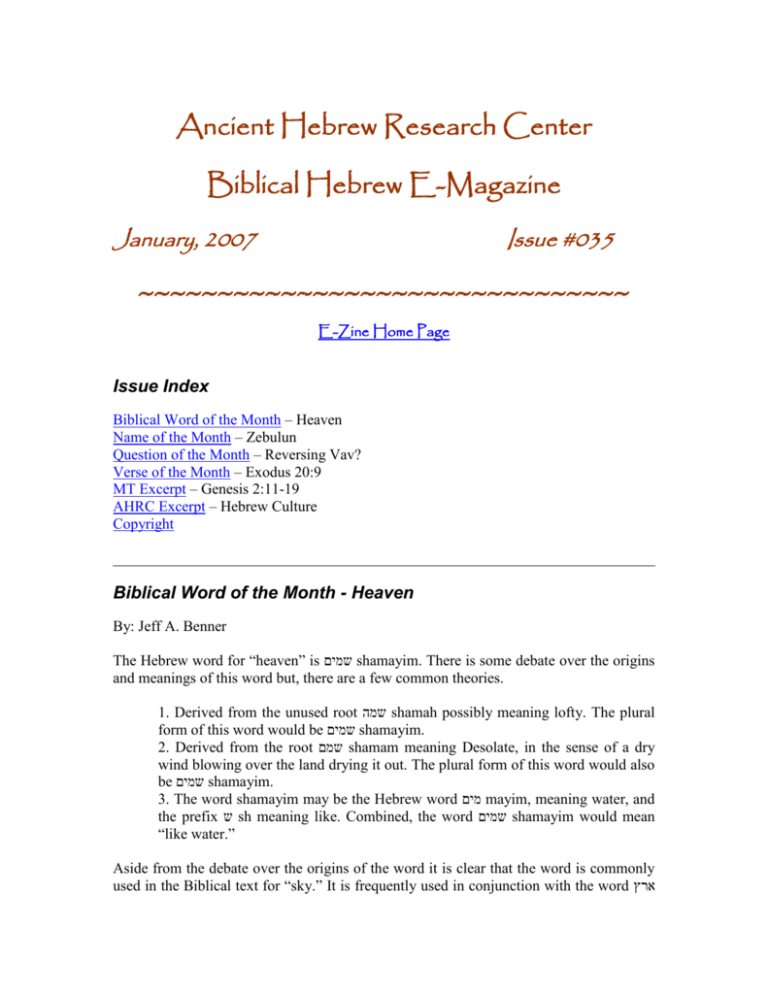
Ancient Hebrew Research Center Biblical Hebrew E-Magazine January, 2007 Issue #035 ~~~~~~~~~~~~~~~~~~~~~~~~~~~~~~~ E-Zine Home Page Issue Index Biblical Word of the Month – Heaven Name of the Month – Zebulun Question of the Month – Reversing Vav? Verse of the Month – Exodus 20:9 MT Excerpt – Genesis 2:11-19 AHRC Excerpt – Hebrew Culture Copyright ________________________________________________________________________ Biblical Word of the Month - Heaven By: Jeff A. Benner The Hebrew word for “heaven” is שמיםshamayim. There is some debate over the origins and meanings of this word but, there are a few common theories. 1. Derived from the unused root שמהshamah possibly meaning lofty. The plural form of this word would be שמיםshamayim. 2. Derived from the root שמםshamam meaning Desolate, in the sense of a dry wind blowing over the land drying it out. The plural form of this word would also be שמיםshamayim. 3. The word shamayim may be the Hebrew word מיםmayim, meaning water, and the prefix שsh meaning like. Combined, the word שמיםshamayim would mean “like water.” Aside from the debate over the origins of the word it is clear that the word is commonly used in the Biblical text for “sky.” It is frequently used in conjunction with the word ארץ Biblical Hebrew E-Magazine erets, meaning land (see Gen 1:1, 2:1 and 14:19), representing the whole of creation and the domain of God. In the New Testament this word was used as a Euphamism (one word used in place of another) for God. This can be seen in some of the parables where the book of Luke (written for Gentiles) uses the phrase “Kingdom of God” whereas Matthew (written to Jews) uses “Kingdom of Heaven.” In this context, heaven is meant to represent God, not a place. ________________________________________________________________________ Name of the Month - Zebulun By: Jeff A. Benner Note: At the request of one subscriber we will be doing a series on the sons of Jacob. The root for the name Zebulun is זבלzaval meaning to reside, to dwell. This is seen in Leah’s reason for naming him this name. And Leah said, God hath endowed me with a good dowry; now will my husband dwell (zaval) with me, because I have borne him six sons: and she called his name Zebulun. (Genesis 30:20) The noun derivitive זבולzevul means residence and is used in 1 Kings 8:13; I have surely built a house for you for a residence. _______________________________________________________________________ Question of the Month – Reversing Vav? By: Jeff A. Benner Q: I have read that the letter יy prefixed to a verb represents “he” in the Imperfect Tense but, in all English Bibles why is ויראvayar and ויקראvayiqra translated in the perfect tense? A: It is correct that the prefix יy (the letter yud) identifies the subject of the verb as masculine singular and in the imperfect tense. But, most of the time, when the letter וv (the letter vav), meaning and, is prefixed to the imperfect verb, it reverses the tense of the verb. For instance the word יקראyiqra means "he will call" while ויקראvayiqra means "and he called." In the reverse, the verb קראqara means "he called" while וקראveqra means "and he will call." ________________________________________________________________________ 2 Biblical Hebrew E-Magazine Verse of the Month – Exodus 20:9 By: Jeff A. Benner This is an ongoing look at the 20th chapter of Exodus and the "Ten Commandments" or more literally "ten of the orders." ל־מלַּ אכְ ֶׁתָך ׃ ְ ָית כ ָ שֵׁ ֶׁשת י ִָמים ַּת ֲעבֹד וְ עָ ִש Six days shalt thou labor, and do all thy work; (ASV) ( שֵׁ שֶׁ תshey-shet) The base word is ששהshishah meaning six but is written in the construct - six of...; so the letter הis changed to a ת. ( י ִָמיםyah-meem) The base word is יוםyom meaning day with the plural suffix יםiym. ( ַּת ֲעבֹדtah-ah-vod) The verb is ‘ עבד.b.d meaning to serve. The prefix תidentifies the subject of the verb as second person, masculine singular and the tense of the verb as imperfect - you will serve. ית ָ ( וְ עָ ִשve-ah-siy-tah) The verb is ‘ עשה.s.h meaning to work. The suffix תidentifies the subject of the verb as second person, masculine singular and the tense of the verb as perfect - you worked. The prefix וmeans and but also reverses the tense of the verb - and you will work. ( כָלkol) A word meaning all. ( ְמלַּאכְ ֶׁתָךme-lakh-teh-kha) The base word is the noun מלאכהmelakhah meaning work. The suffix means ךis the possessive pronoun your (masculine singular)- your work. The following is a literal rendering of this verse from its Hebraic meaning. Six of the days you will serve and you will work all your work In following issues we will continue with this chapter. 3 Biblical Hebrew E-Magazine ________________________________________________________________________ Mechanical Translation Excerpt - Genesis 2:11-19 11 the title of the one is “Pishon [Scatter]”, the one going around all of the land of the “Hhawilah [Twisting]” which there is the gold, 12 and the gold of that land is functional, there is the amber and the stone of the shoham, 13 and the title of the second river is “Giyhhon [Burst]”, he is the one going around all of the land of “Kush [Black]”, 14 and the title of the third river is “Hhideqel [Rapid]”, he is the one walking eastward of “Ashur [Step]” and the fourth river he is “Perat [Break]”, 15 and “YHWH [He exists]” of “Elohiym [Powers]” took the human and he caused him to be deposited in the garden of “Eden [Pleasure]” to serve her and to guard her, 16 and “YHWH [He exists]” of “Elohiym [Powers]” directed upon the human saying, from all of the trees of the garden an eating you will eat, 17 and from the tree of the discernment of function and dysfunction you will not eat from him given that in the day you eat from him a dying you will die, 18 and “YHWH [He exists]” of “Elohiym [Powers]” said, it is not functional for the human existing by himself, I will make for him a helper like his opposite, 19 and “YHWH [He exists]” of “Elohiym [Powers]” molded from the ground all of the living ones of the field and all of the flyers of the sky and he made come to the human to see what he will call out for him and all of which the human will call out to him a being of life he was his title, For details on this new translation see the web site at http://www.mechanical-translation.org _______________________________________________________________________ AHRC Website Excerpt – Hebrew Culture Several videos on the Ancient Hebrew Culture are available here - http://www.ancienthebrew.org/38_audiovisual.html. ________________________________________________________________________ Copyright © 2007 Jeff A. Benner Ancient Hebrew Research Center Please feel free to use, copy or distribute any material within the "Biblical Hebrew E-Magazine" for nonprofit educational purposes only. ________________________________________________________________________ 4
